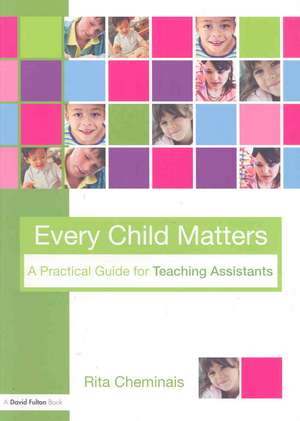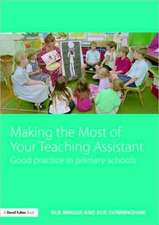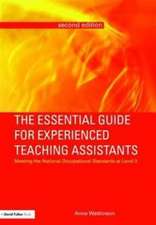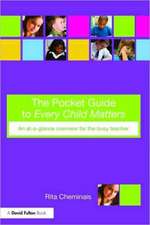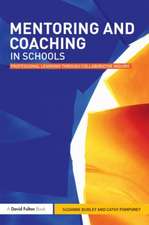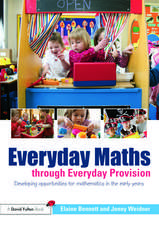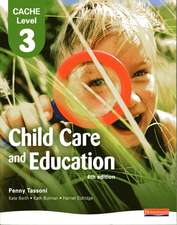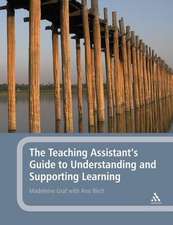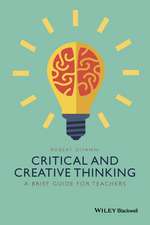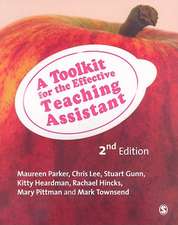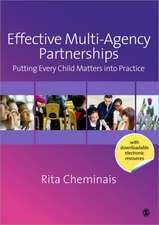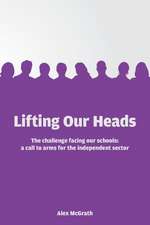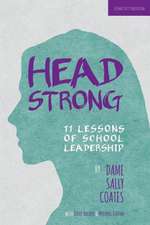Every Child Matters: A Practical Guide for Teaching Assistants
Autor Rita Cheminaisen Limba Engleză Paperback – 14 apr 2008
Coverage includes:
- an overview of the Every Child Matters change for children programme and how this informs the role of the teaching assistant working in multi-disciplinary school personalised learning and well being teams
- applying existing practical strategies to develop children and young people’s skills as confident, collaborative and independent learners who experience positive ECM outcomes
- monitoring and evaluating the impact of teaching assistant support in improving the ECM outcomes
- how teaching assistants can meet the requirements of the OFSTED inspection process.
Every Child Matters: A Practical Guide for Teaching Assistants provides a clear description of what the ECM agenda means for TAs and how it will impact on their role. It is also a valuable resource for all those line managing and supporting the continuing professional development of teaching assistants, from local authorities, FE and HE organisations.
| Toate formatele și edițiile | Preț | Express |
|---|---|---|
| Paperback (2) | 205.09 lei 43-57 zile | +14.84 lei 5-11 zile |
| Taylor & Francis – 14 apr 2008 | 215.08 lei 22-36 zile | +14.84 lei 5-11 zile |
| Taylor & Francis – 31 mai 2006 | 205.09 lei 43-57 zile | |
| Hardback (1) | 683.59 lei 43-57 zile | |
| Taylor & Francis – 11 apr 2016 | 683.59 lei 43-57 zile |
Preț: 215.08 lei
Nou
Puncte Express: 323
Preț estimativ în valută:
41.15€ • 43.08$ • 34.05£
41.15€ • 43.08$ • 34.05£
Carte disponibilă
Livrare economică 17-31 martie
Livrare express 28 februarie-06 martie pentru 24.83 lei
Preluare comenzi: 021 569.72.76
Specificații
ISBN-13: 9780415458764
ISBN-10: 0415458765
Pagini: 152
Ilustrații: 27 black & white tables, 15 black & white halftones, 16 black & white line drawings
Dimensiuni: 210 x 297 x 8 mm
Greutate: 0.39 kg
Ediția:New.
Editura: Taylor & Francis
Colecția David Fulton Publishers
Locul publicării:Oxford, United Kingdom
ISBN-10: 0415458765
Pagini: 152
Ilustrații: 27 black & white tables, 15 black & white halftones, 16 black & white line drawings
Dimensiuni: 210 x 297 x 8 mm
Greutate: 0.39 kg
Ediția:New.
Editura: Taylor & Francis
Colecția David Fulton Publishers
Locul publicării:Oxford, United Kingdom
Public țintă
Professional Practice & DevelopmentCuprins
Introduction 1. Every Child Matters: opportunities and challenges for teaching assistants 2. Teaching Assistants Removing Barriers to Learning and Well Being 3. Every Child Matters and the Role of the Teaching Assistant 4. Teaching Assistants Supporting Pupils to be Healthy and Stay Safe 5. Teaching Assistants Supporting Pupils to Enjoy and Achieve 6. Teaching Assistants Supporting Pupils to Make a Positive Contribution and to Achieve Economic and Social Well Being 7. Monitoring and Evaluating the Impact of Teaching Assistant Support and Interventions on Pupils Every Child Matters Outcomes
Notă biografică
Rita Cheminais is the School Improvement Adviser for Inclusive Education in Tameside Services for Children and Young People.
Recenzii
"Rita writes with clarity and brevity about what practitioners need to understand and be able to do. She is an established authority on Every Child Matters and well placed to provide guidance on how its principles should permeate every aspect of the teaching assistant role. If you are a TA, or if you work with TAs, you need this book." - Dr. Linda Evans (Educational Consultant)
Anne Watkinson
I am concerned that the slant of the book is essentially about ‘appropriate support and intervention’ to promote inclusion. It is for those children and young people who have ‘additional needs’. This is a book for those TAs who are sometimes referred to as LSAs, learning support assistants, whose main concern is with enabling children with special educational needs (SEN) to succeed in mainstream education. This may not be so helpful for those TAs who are generalist, classroom assistants or HLTAs taking whole classes possibly with specialist subjects. All TAs do need to know about the strategies to be described.
The book concentrates on the affective side of a TAs’ work. While this kind of support – for well being, enjoyment, self esteem etc is vital to the learning process, and underpins working with children and young people, it must be as a support to the learning process and the curriculum. It is must be made clear that while an unhappy or uncomfortable child will not learn, the main purpose of a school is to educate – to lead in learning. It is not a children’s home.
While the author refers to learning there is no indication of how developing wellbeing etc. impinges on the learning process itself, usually referred to as psychology. It is all very well to emphasise this underpinning need of us all in a learning process but the book needs to show how it works. All the TA will usually see as a model, is a teacher in action ‘delivering’ – instructing. With luck they will work with a teacher who has good relationships and empathy with the need to develop the affective side of children. Yes, TAs usually work with smaller groups and individuals with whom they can ensure that these attitudes and strategies are in place and effective. I would like to see a little more link between the ideas promoted by the author and the psychological aspects of learning (how the brain works) and both these to the visible techniques and expected outcomes (dare I say results?) for the pupils.
5. The strengths of this proposed book.
'This book is up to date and relevant to the work of a teaching assistant. It provides the background to current legislation as well as lots of practical information.
It is clearly laid out and easy to read or to use as a reference book. It provides information on how children learn and how teaching assistants can support learning and promote well being.' - Customer Review on Amazon
'Some schools cannot afford the time to induct TAs fully in all aspects of legislation so this book is an excellent guide. It also demonstrates how the national occupational standards of the Supporting Teaching and Learning NVQ sits within the principles of Every Child Matters. A very useful and easy book to have as a staff resource.' - Customer Review on Amazon
Anne Watkinson
- My areas of teaching, pupil support and responsibility.
Ex primary teacher, headteacher and Local Authority senior adviser. Free lance educational adviser specialising in teaching assistants (TAs) Research and experience in the field of managing and training TAs. Ex consultant to DfES, and TDA regarding TAs. Author 6 books for and about TAs and Higher Level TAs (HLTAs) David Fulton Publishers and Routledge
- The proposed title
This is clear. My first reaction (without reading the proposal) was why do TAs need a book about this? My current understanding is that schools and areas will vary enormously as to how this affects them. The principles of Every Child Matters(ECM) are clearly explained in government literature both in detailed legislative form and simple summary form. The proposed Children Centres and multi agency working will be so different from place to place urban to rural, existing arrangements, LA to LA etc. The new inspections will focus on this field but these are likely to be very superficial regarding actual observations of people working in the school or interviews that TAs are less likely than before to be affected. Although clear, it does however limit the reader to expect a book underpinning a Government initiative, rather than addressing fundamental issues. Then I read the proposal.
- Need for the book
See answer to item 2. Yes, all TAs will need to know that this major initiative will eventually affect the ways in which schools are organised, although the actual practical details that are likely to affect TAs will have to worked out locally. It would be good to think that TAs would be sufficiently concerned about legislation and national initiatives to be interested. It would be really good to think that management were sufficiently communicating with their TAs to tell them about this, but I fear still too many TAs do not meet together to get regular updates on things like this. ECM affects primary and secondary, all young people under 18. HLTAs and those TAs undertaking foundation degrees should understand the implications and seriousness of the issues which led to the initiative and the potential outcomes. However, the principles that underpin ECM are valid and important, often neglected in favour of more obvious things like subject matter, and that is what this book is aiming to address.
- My immediate reaction
I am concerned that the slant of the book is essentially about ‘appropriate support and intervention’ to promote inclusion. It is for those children and young people who have ‘additional needs’. This is a book for those TAs who are sometimes referred to as LSAs, learning support assistants, whose main concern is with enabling children with special educational needs (SEN) to succeed in mainstream education. This may not be so helpful for those TAs who are generalist, classroom assistants or HLTAs taking whole classes possibly with specialist subjects. All TAs do need to know about the strategies to be described.
The book concentrates on the affective side of a TAs’ work. While this kind of support – for well being, enjoyment, self esteem etc is vital to the learning process, and underpins working with children and young people, it must be as a support to the learning process and the curriculum. It is must be made clear that while an unhappy or uncomfortable child will not learn, the main purpose of a school is to educate – to lead in learning. It is not a children’s home.
While the author refers to learning there is no indication of how developing wellbeing etc. impinges on the learning process itself, usually referred to as psychology. It is all very well to emphasise this underpinning need of us all in a learning process but the book needs to show how it works. All the TA will usually see as a model, is a teacher in action ‘delivering’ – instructing. With luck they will work with a teacher who has good relationships and empathy with the need to develop the affective side of children. Yes, TAs usually work with smaller groups and individuals with whom they can ensure that these attitudes and strategies are in place and effective. I would like to see a little more link between the ideas promoted by the author and the psychological aspects of learning (how the brain works) and both these to the visible techniques and expected outcomes (dare I say results?) for the pupils.
5. The strengths of this proposed book.
- It emphasises the importance of the affective side of education which underpins development and learning.
- It offers practical strategies and activities for TAs.
- It is using a current thrust of Government policy to be the framework for some fundamental ideas.
- It emphasises the positive aspects of learning.
- The author is clearly well known to DFP (Routledge) and speaks authoritatively about this area.
- The weaknesses of this book
- It is rather long for the ‘ordinary’ TA – 110 pages, 135000 words. My PhD was only 82000 words! It will be more suited, in the depth indicated by this length, for those studying for TA foundation degree or tutors and advisers. A much shorter succinct book would of more use to those studying at NVQ 2 and 3 level. One of DFP A4 books would fit the bill better than a long textbook which this length would indicate.
- It appears to make little reference to the curriculum and teaching and learning strategies. It would thus be one of a number of books that a TA studying their role would need. It concentrates on the support role of TAs in helping pupils with additional needs.
- The author is obviously an expert in the area of SEN and inclusion hence the audience is LSA rather than the generalist TA. This should be made clear. While it is true that good practice for those with SEN is good practice for all children, there are affective issues regarding the middle ground and able achievers that need to be considered, such as: high expectations, how to deal with coasting learners, how to avoid the ‘velcro’ approach with SEN learners. Too much support can undermine the learners’ own strengths.
- It may become dated, leaning so heavily on the ECM agenda. While this agenda is important, it is a political initiative which may be superseded.
- It is ‘to empower TAs to meet the ECM agenda’ but it does not make clear that schools have many agendas, of which this is one, or how this agenda relates to the other agendas – e.g freeing the curriculum for primary schools, ensuring high standards for all, behaviour management, etc.
- What is missing in the contents
- The areas mentioned in the above paragraphs.
- The importance of relationships between TA and pupil, TA and TA and TA and teaching staff.
- What to do if the teacher with whom the TA is working, or the school ethos or climate does not support such an agenda.
- The relationship of support to the formal, informal and hidden curriculum of a school.
- Possible competition
I do not know of a book that tackles the ECM agenda for TAs in this way. There are books that help LSAs support pupils in the affective domain, for example Glenys Fox’s book on Learning Support Assistance. She has a more holistic approach to the whole subject of supporting pupils and her book is short enough and basic enough to be of use to the beginning and ‘ordinary’ TA as well as LSAs. Other DFP books tackle individual SEN matters – Asberger’s or Down’s – but not just this affective area I think.
- Purchase of this book
I would purchase this book as a useful addition to my library of TA books. However I would advise any TA to look carefully before purchase, this should not be the only book they use to support their own learning and practice.
- Other comments
Marcelo Staricoff
Please identify your areas of teaching, pupil support and responsibility.
I am currently the Deputy Headteacher at St. Bartholomew’s CE Primary School in Brighton. I also teach a Year 5 class and I am responsible for leading Numeracy, Assessment, Behaviour, Thinking Skills and G&T in our school. I am directly responsible for the performance management of the Midday Lunchtime Supervisors and I work alongside a teaching assistant in my Year 5 class (75% of curriculum time). I have a particular interest in Thinking Skills, Philosophy for Children and G&T Provision and I have written several articles on how these approaches to teaching and learning can be incorporated into the daily routine of a primary classroom. I have recently published a book, entitled Start Thinking, Imaginative Minds, 2005 [ISBN 1904806023] which is a collection of open ended ‘thinking skills starters’ that children engage with when they first enter the classroom in the morning. I am a member of NAGTY’s Think Tank and Primary Expert Advisory Group, of SAPERE’s National Committee and of Brighton’s Creativity Steering Group. I regularly speak at National Conferences and run CPD and INSET days for schools.
Please comment on the proposed title – is it clear/appropriate/appealing? Can you suggest an alternative title?
The title is very appropriate I would say, especially as it is another one in the series of ‘Every Child Matters’ by the same author. Having Every Child Matters as part of the title is an immediate draw for anyone currently working in Education. My only doubt is that in the Background section it states that the book will support the learning and well being of children with additional needs. As the title stands this is not clear and if this is the case it may need an explanatory sub-title. The rest of the proposal seems to deal with TAs supporting all children in helping the school to meet the ECM agenda, in which case the title would be alright.
Do you agree that a book of this type is needed? Who would be the main audience for it? Would it appeal to both primary and secondary sectors?
I definitely agree that there is a need for a book that addresses the Every Child Matters from a Teacher’s Assistant point of view. A fantastic and original idea which will represent an invaluable resource for all educational establishments, especially in Primary Schools where TAs play such an important role in nurturing children and contributing to their personalised learning.
What was your immediate reaction to the proposal? Did you like it or dislike it? Did you find it straightforward or confusing?
I really liked it as soon as I started reading it- the more I read it and the more times I read it I became increasingly convinced of its value- especially if it doesn’t restrict itself to TAs supporting children with additional needs. Although many schools view TAs as solely helping children with additional needs, I feel that they can if deployed creatively and respectfully contribute enormously to the success of all in the classroom. It all seems to be very clearly thought out and the Chapters are very well designed in terms of content and continuity.
What are the strengths of this proposed book?
I feel the book has a number of strengths. The author is obviously an expert in the field and a very successful writer of books on similar topics. It feels me with confidence that this book will be of equal quality. To bring the ECM agenda to the fore is invaluable at the moment and to provide schools with guidance as to how have TAs at the heart of school success is a great commodity. The deployment of TAs has always being an ‘issue’ with all schools I have been involved with and after every inspection/observation that I have been involved in. raising the profile of TAs is what this book will do so well. Including information on personalised learning and assessment for learning will also place TAs at the cutting edge of educational initiatives. Examples of practical support and strategies for all five areas of the ECM agenda would be fabulous. The Monitoring and Evaluating chapter is what schools are now judged by and this chapter would be invaluable for all heads.
What are the weaknesses of this book?
From a weakness point of view, the only slight concern is the author’s assertion that ‘it will be a guaranteed best seller’. In combining theory and practical support strategies it may attract forward looking heads, but from personal experience TAs do not generally buy books themselves for their own CPD and very often are not used to dealing and assimilating educational literature. I feel that the book would be bought more as a single copy by heads rather than as a working document which teachers and TAs would want to acquire. If that is the case, heads would have to be very good at sharing the ‘practical chapters’ with the TA workforce. Having said that, I would definitely buy a copy to promote the role of TAs in our school.
What is missing (if anything) in the contents?
Only greater clarity as to whether it is intended to support TAs dealing with children with additional needs or for all TAs regardless of their child remit in and out of class.
Are you aware of any other books now on the market that compete with this book (that are on the same topic and have the same approach)?
I don’t know of any other books focusing on the TA role as part of the ECM agenda and as such it is unique as the author suggests.
Would you buy this book?
I would definitely buy this book. I feel that TAs are the ‘make or break’ of successful schools and not enough guidance is given to teachers and TAs as to how to best promote learning in the classroom. I think that this book would allow schools to approach the TA issue from a ‘third party’ point of view- i.e. if it is what the ECM agenda demands then both parties are much more likely to feel that they are working towards a common goal rather than feel that things are being imposed on them without any thought behind the proposals.
Any other comments you wish to make about this book proposal?
I feel that I would have liked to have seen a chapter in greater detail, especially the chapters dealing with practical support strategies. Overall it does seem apt for publication at this time. Would the author feel it necessary to mention something about the Renewed Frameworks for Literacy and Numeracy which are going to have such a big impact in all classrooms in the next year or so?
'This book is up to date and relevant to the work of a teaching assistant. It provides the background to current legislation as well as lots of practical information.
It is clearly laid out and easy to read or to use as a reference book. It provides information on how children learn and how teaching assistants can support learning and promote well being.' - Customer Review on Amazon
'Some schools cannot afford the time to induct TAs fully in all aspects of legislation so this book is an excellent guide. It also demonstrates how the national occupational standards of the Supporting Teaching and Learning NVQ sits within the principles of Every Child Matters. A very useful and easy book to have as a staff resource.' - Customer Review on Amazon
Descriere
This essential and ground-breaking resource for all practicing and aspiring teaching assistants brings together all the crucial information necessary to support the full diversity of learners, from Early Years to Key Stage 4 in one comprehensive volume. Based on the revised National Occupational Standards for teaching assistants, this book effectively supports the personalized learning and Every Child Matters (ECM) well being of children and young people in schools.
This accessible, user-friendly book provides a wealth of practical resources, including photocopiable materials, templates, and positive solution-focused advice to support busy teaching assistants.
This accessible, user-friendly book provides a wealth of practical resources, including photocopiable materials, templates, and positive solution-focused advice to support busy teaching assistants.
